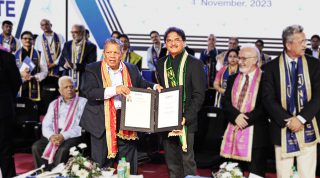Indian logistics is set to witness the dawn of a new era, with the launch of the National Logistics Policy (NLP), aimed at enhancing seamless connectivity across all modes of transportation, through improved network and capacity utilization that can pave the way for global logistics competitiveness. For leading logistics players like Allcargo Group, this presents an immense opportunity to ride the growth wave and make a significant contribution to India’s growth story.
The National Logistics Policy (NLP) is a bold and transformative step that has the potential to revolutionize the logistics industry, through digitalization, better optimization of resources, and a focus on building next-gen physical and digital infrastructure. With its structured and holistic approach, it will aid the implementation of the PM Gati Shakti National Master Plan, as well as help integrate and amplify the positive impact of other initiatives like Make in India, Digital India, Production-Linked Incentives, GST, etc.
“The launch of NLP will bring transparency through digital integration in addition to boosting speed and efficiency. It will enable fast-paced logistics infrastructure development, better coordination among multiple stakeholders, simplify processes and documentation and boost last-mile connectivity,” says Shashi Kiran Shetty, Chairman, Allcargo Group.
A holistic, digital-first approach
One of the key strengths of the NLP is the fact that it takes an overarching view of existing ministries, departments, projects, and key stakeholders, to create a unified platform, providing end-to-end visibility and scope like never before. The four main objectives of NLP cover the entire spectrum of activities.
- Integration of Digital System (IDS): Digital integration of different systems of departments like road transport, railways, aviation, commerce ministries and foreign trade.
- Unified Logistics Interface Platform (ULIP): This would ensure shorter and smoother cargo movements, while enabling the exchange of information confidentially, on a real-time basis.
- Ease of Logistics (ELOG): Ensure the ease of logistics business through transparency and accessibility.
- System Improvement Group: Monitor all logistics-related projects regularly
By implementing transformation projects, bringing in digitalization across its systems, processes and operations, Allcargo Group has been at the forefront of introducing proprietary digital tools and new-age technology like ECU360, myCFS, Gati Genie, etc. to enhance efficiencies. Its synergy with NLP and Gati Shakti increases manifold, as a result of strong digital play being core to both.
“Launch of the National Logistics Policy is a truly landmark decision, especially in terms of the direction it offers for the implementation of PM Gati Shakti, which envisions a complete overhaul of the logistics sector to make it more efficient, competitive and digitalized. As we commit to delivering India’s progress every day, all of us at Gati are proud to bring our shakti to power Gati Shakti and NLP, with excellence in express distribution, multimodal transportation, last mile logistics, and most importantly, relentless effort and passion to bolster businesses across the length and breadth of the country”, says Pirojshaw Sarkari (Phil), CEO, Gati Limited.
Infrastructure and capacity building to ease logistics
NLP aims at building a robust infrastructure that can modify the multimodal mix of Indian logistics to reduce the over-dependence on road movements and accelerate the growth in waterways, which have the potential to not only increase speed and efficiency, but also are a more sustainable mode of transport. A number of projects like Bharatmala, Sagarmala, Dedicated Freight Corridors (DFC), are likely to accelerate the implementation of NLP.
With expertise and proven excellence in global cargo movements via ocean, road, and air, integrated logistics services providers like Allcargo Group can explore multiple opportunities and build collaborative public-private partnerships to drive efficiencies and consequently bring down the cost of logistics.
Impetus to skills and entrepreneurship
With India’s aspirations to grow into a USD 5 trillion economy and the logistics sector geared to be a key contributor, it is important to bridge the industry’s skill gap, which is one of the factors the NLP addresses while building on the employment generation.
Further, by creating a unified digital platform, the NLP helps create a level playing field, so that even niche, specialized MSMEs can compete effectively in India and globally. By bolstering MSMEs which are the backbone of India’s economy, the NLP further brightens India’s prospects in achieving its bold ambitions of establishing itself as a global trade destination and hub.
Conclusion
In view of how important it is to be competitive at a global level, the Indian government has rightly focused on giving logistics a powerful roadmap with this interdisciplinary, cross-sectoral framework designed to address the key challenges of high cost, lack of infrastructure, inefficiency, and skill building.














